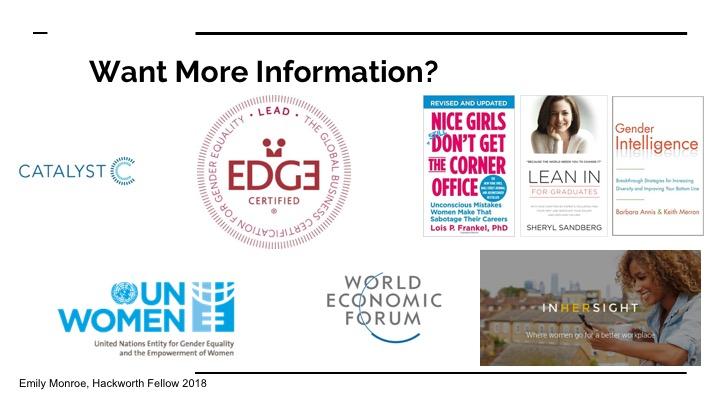At the end of each interview, I asked each woman the same question: What advice would you give to young women getting ready to enter the work world for the first time? From these answers, I wrote an article that was published originally in the Santa Clara newspaper called "10 Steps for a Woman to Take Control of Her Career.

Creating Dialogue and Finding Solutions
Ten Steps for Women to Take Control of Their Career
This piece was originally published as an editorial in The Santa Clara.
In November 2017, the World Economic Forum announced that the disparity between men and women’s opportunities in education, health, and politics had actually increased rather than decreased. In Silicon Valley, the lack of gender diversity and continued bias against women remains ingrained in the professional world.
Societal and organizational changes are necessary in order to fully achieve gender equity in business. Until these shifts take place, there are some steps that young women can take to navigate their careers effectively. As part of my research as a Hackworth Fellow with the Markkula Center for Applied Ethics, I asked twelve high-powered women in various fields and industries from law to human resources to venture capital to sports finance to share their insights on how women can navigate the murky waters of gender inequity.
From these conversations, I have consolidated their advice into 10 key steps to help young women own their careers.
1. Find Mentors and Sponsors
Behind every successful person stands mentors and sponsors. When looking for mentors, don’t look for one type of person, such as your boss, or keep a preconceived notion of what your mentor will look like. Mentors are often not members of your team, your department, or even your organization. Look for someone whom you click with and relate to, then create a genuine relationship, making sure that it feels like a mutually beneficial relationship and not just a one-way street.
2. Speak Up and Speak Up Early
Speak up early in meetings, because if you stay quiet at the start of the meeting, you probably will not say anything at all. While it can be daunting to give your opinion in a meeting with senior members, the organizers included you in the meeting because they value your perspective. Additionally, if you have questions, ask them! Don’t be shy about clarifying things and if you aren’t comfortable broaching a question in a larger meeting, then ask afterward individually.
3. Keep Things Professional
Be polite and professional to everyone. Sometimes men can get away with being rude or brash, but there is a professional expectation for women to remain polite. This becomes part of your brand, so be very careful to protect it. Additionally, cut yourself off after one drink at work events. Nothing good happens after the second drink. If you want to be taken seriously, stay sober.
4. Remain Resilient
Not every job is going to be your dream job, but every job that you have will teach you something new and introduce you to new people. Don’t be discouraged if the job you start with is not the job that you love. Learn everything you can from that experience and take it with you to your next opportunity.
5. Work Hard and Work Smart
Stay out of office politics and focus on producing great work. Don’t be distracted by sexism or politics. Instead, keep your goals in your sightline and do great work, quantifying and communicating your successes.
6. Take Ownership of the Interview Process
An interview is an opportunity for you to learn about the company just as much as it is about the company learning about you. Take the time to ask questions about management style and company culture to see if the company is actually going to be a good fit. Don’t be so anxious to secure a job that you allow a company to run your career for you.
7. Be Willing to Fail and Fail Gracefully
Putting yourself out there is scary, but forge ahead believing that you are capable. When you make mistakes (because there are going to be times when you screw up), take responsibility for it, let it roll off your back, and continue moving forward.
8. Trust Your Own Abilities
Be confident. Confidence does not mean that you have to be the loudest or the most boastful person in the room. Have faith in your own abilities.
9. Ask, Ask, Ask for Opportunities
Don’t wait for opportunities to be offered to you. Create your own opportunities and continue to ask for what you want. Volunteer for things, even if they are outside of your comfort zone. Men ask for things, so women should not be intimidated by the process. We too must take control of their careers.
10. Pick Your Battles Carefully
If you make a mountain out of a molehill or fight every little battle that comes your way, when something comes up that really matters, your voice will not have much sway. What you fight for affects your personal brand, so pick your battles carefully. Then, once you come across something that you are willing to fight for, fight like hell.
Entrepreneurship Facts
Entrepreneurship thrives in Silicon Valley, but diversity in the start-up world and STEM fails to keep up.
- Between 2010 and 2015, only 10% of venture capital funding globally went to women.
- Women-owned businesses account for 30% of global businesses.
- Women own only 5% of startups.
- Women hold only 11% of executive positions at Silicon Valley companies.
- The quit rate in the high-tech industry is more than twice as high for women (41%) as for men (17%).
- Women receive lower salary offers than men for the same job at the same company 63% of the time.
- Women made up less than 25% of those employed in STEM occupations in 2015.
- Palo Alto and San Jose are the two cities in the United States with the smallest percentage of female entrepreneurs.
- 94% of decision-makers at venture capital funds are men.
- 48% of female founders cite a lack of available mentors as holding them back.
- Women filled 47% of all US jobs in 2015, but only 24% of STEM jobs.
Sources:
https://www.inc.com/lisa-calhoun/30-surprising-facts-about-female-founders.html
http://www.catalyst.org/knowledge/women-science-technology-engineering-and-mathematics-stem
http://observer.com/2017/06/women-in-tech-statistics/
https://www.entrepreneur.com/article/285656
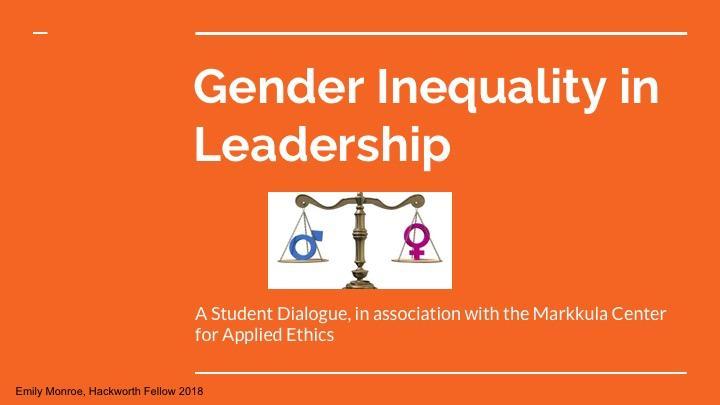
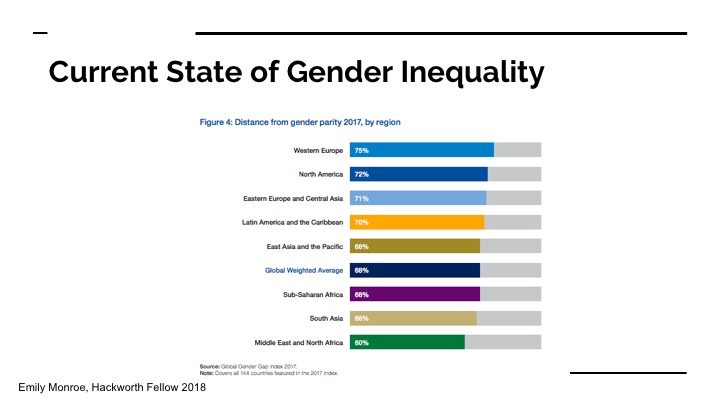
Information from the World Economic Forum’s Global Gender Gap Report 2017
Four categories of measurement:
Economic participation and opportunity
Educational attainment
Health and survival
Political empowerment
Current State of Women:
Article by CNN Money: “It’s Getting Even Harder to be a Woman”: November 2, 2017:
“The World Economic Forum says in a new report that "equality is in retreat" for the first time since the group started tracking the issue in 2006.”
This is a global measure that involves more than just women in leadership roles, but also things like education equality, but the US itself went down four rankings this year to 49th out of 144 countries (in 2006, the US was in the 23rd spot)
Only 32 of the fortune 500 CEOs are women (about 6%) as of 1.16.18
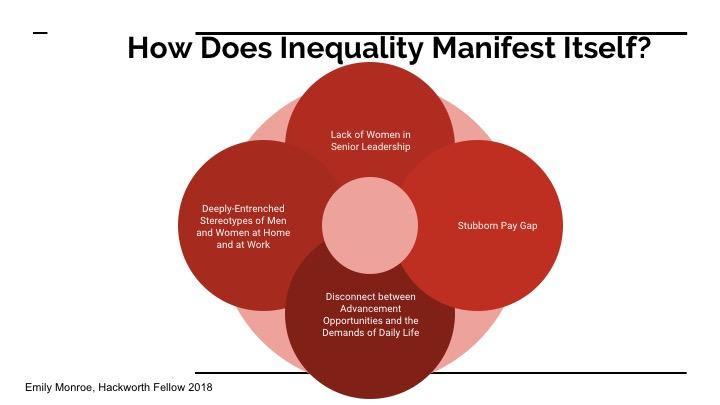
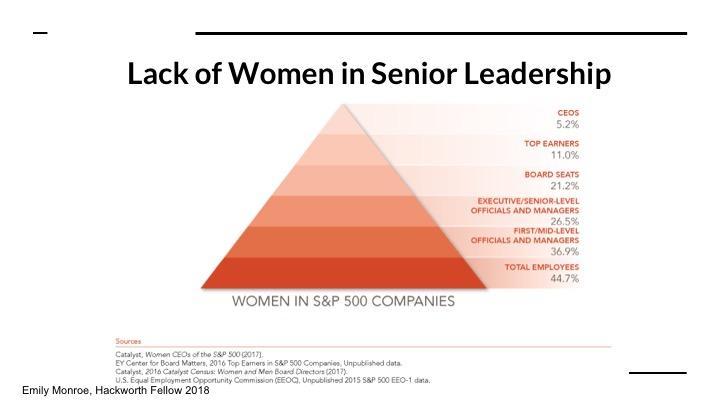
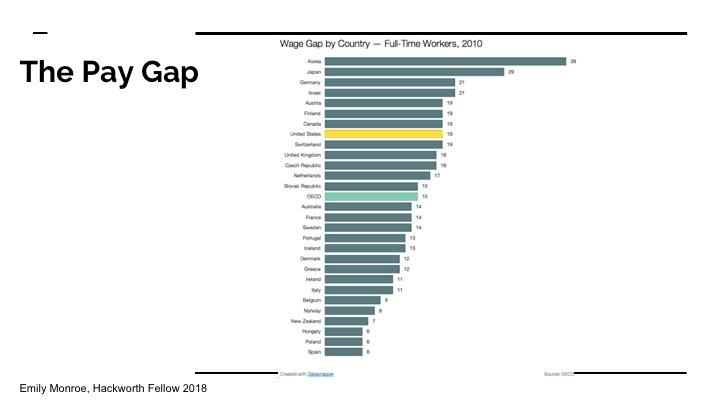


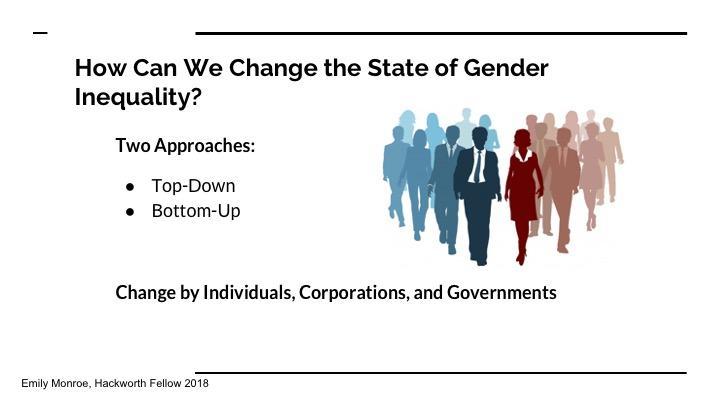
Example:
Pay Gap:
Individual: negotiate salary
Company level: pay transparency
Governmental level: CA law to prevent new employers to ask for old salary, new UK law requiring companies with more than 250 workers to publish pay gap information
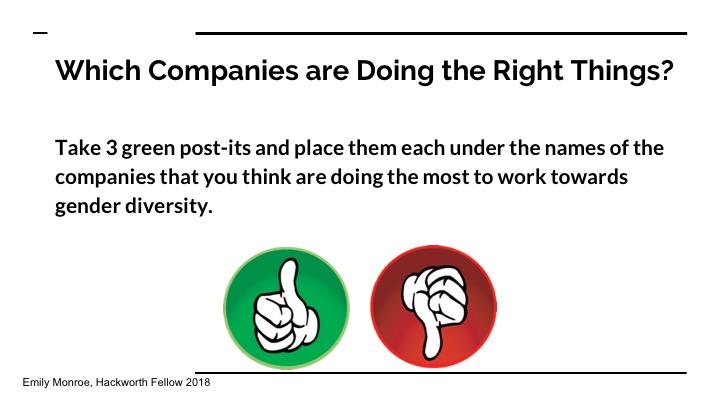
Company options to provide:
SAP
Ikea
Mercer
Uber
Microsoft
Berkshire Hathaway
eBay
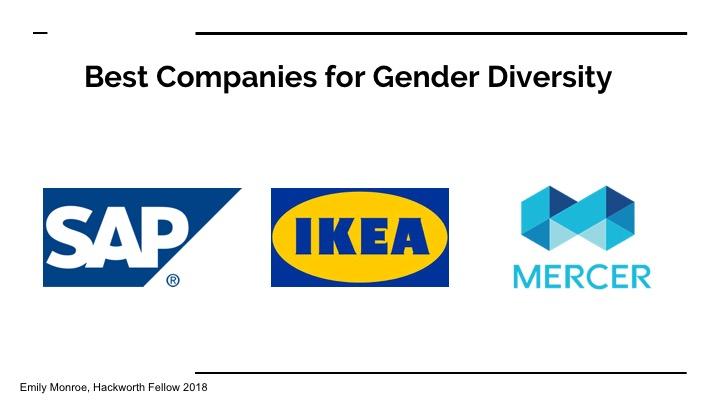
Based on EDGE (Economic Dividents for Gender Equality) Certification
- Global business certification standard for gender equality—completed by independent audit (must be renewed every two years and takes months, if not years to complete audit)
- Four pillars that define success in gender equality:
- Strong gender balance at all levels of the organization
- Proactive management of pay equity in the organization
- A solid framework of effective gender equality policies and practices
- An inclusive culture, as reflected in employees’ high ratings in terms of gender equality
- Key assessment areas:
- Equal pay for equivalent work
- Recruitment and promotion
- Leadership development training and mentoring
- Flexible working arrangement
- Company culture
Best Companies for Women
- Mercer (World’s largest human resources consulting firm)
- “When women thrive, businesses thrive” initiative, including research and summit event in 2015
- changes like creating healthcare programs and retirement programs that are more focused towards women’s needs and reality
- Ikea (Swedish company—Sweden ranked 4th in world for gender equality)
- First company worldwide to reach the highest level of gender equality certification from EDGE in 2015
- Employee voices heard on benefit options most helpful
- More than half of senior managers and executives are women
- All employees get paid parental leave of up to four months
- Female CEO: Simona Scarpaleggia
- Co-chair for the UN Secretary General’s High-Level Panel on Women’s Economic Empowerment
- SAP
- First multinational technology company to earn global recognition for its gender diversity initiative
- 25% of leaderships roles are women and goal to increase by 1% annually to get to 30% by 2022
- Company programs: Leadership Excellence Acceleration Program (LEAP) and Activating Men for Parity
- Global women’s networking group with more than 10,000 people in 60 countries
- Transparency in salaries to attack the pay gap
- First multinational technology company to earn global recognition for its gender diversity initiative
